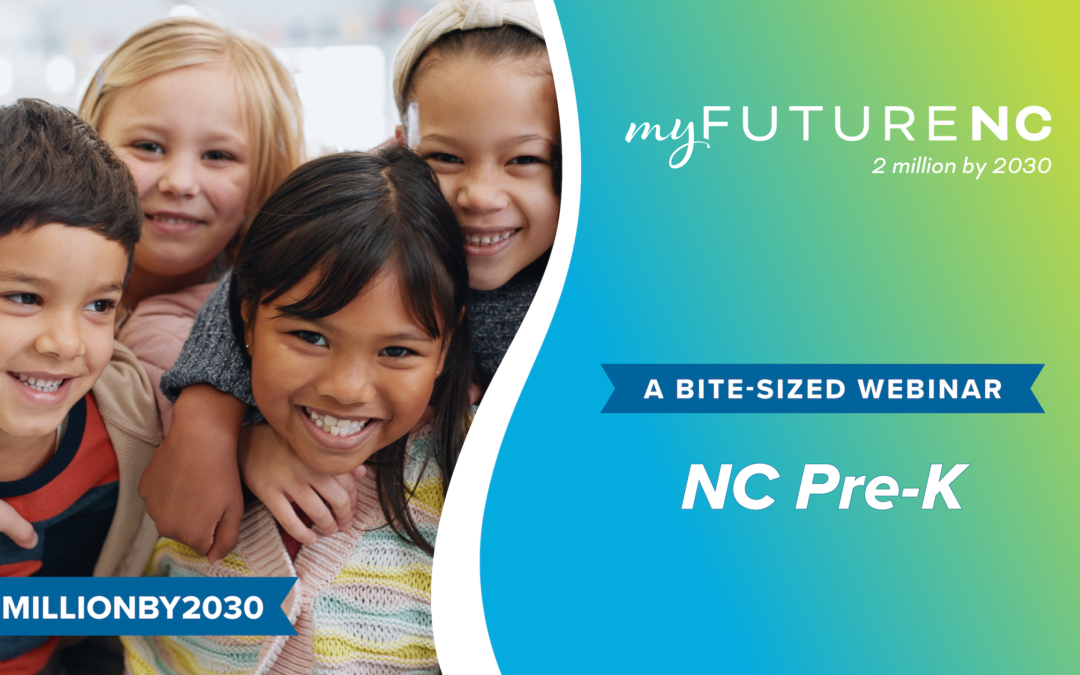This post is the fourth in our series about myFutureNC’s Bite-Sized Webinars. Previous posts covered Family-Sustaining Wages, Labor Market Alignment, and FAFSA and Financial Aid.
The Positive Impact of NC Pre-K
This fourth post in our series on myFutureNC’s Bite-Sized Webinars focuses on early childhood education and on NC Pre-K specifically. As with prior posts in this series, we will be exploring the data for the Land of Sky region as a whole and also individually for our four counties (Buncombe, Henderson, Madison, and Transylvania).
Preston Roseboro, myFutureNC’s Regional Impact Manager for the Piedmont Triad Region, led this Bite-Sized Webinar on April 23, 2024. Mr. Roseboro called out the NC Pre-K enrollment data in the Academic Readiness section on the bottom of page 2 of the statewide attainment profile for NC. According to the state profile, 53% of eligible 4-year-olds were enrolled in the NC Pre-K program, and 10,914 more enrollments are needed to reach the 2030 NC Pre-K goal of 75%.
According to the 2024 regional profile for the Land of Sky, 44% of eligible 4-year-olds were enrolled in NC Pre-K, and 469 more enrollments are needed to meet our 2030 goal of 75% (outlined in red in the image below). Related data points (outlined in gold in the image below) include regional reading and math performance for 3-8 graders, high school graduation rate, and chronic absenteeism rate.
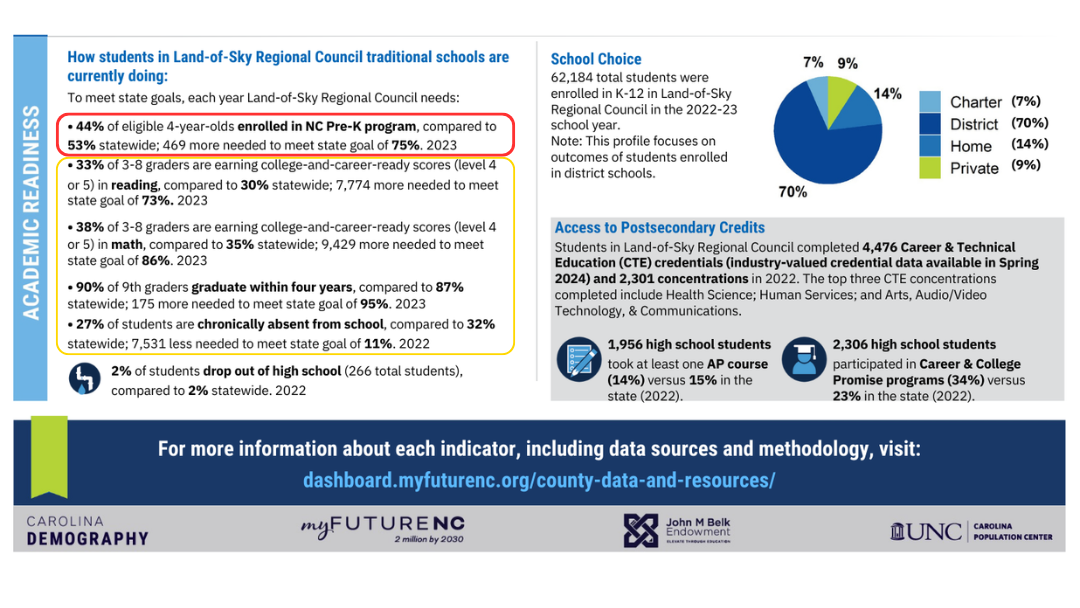
Connection to Our 2030 Goals for Educational & Workforce Attainment
Our first strategic direction is to enhance Pre-K and early childhood education programs’ enrollment. The associated strategic goal that we selected for 2030 pertains to NC Pre-K: Increase enrollment of eligible children to 75%. This matches the statewide goal for NC Pre-K enrollments. According to the 2024 regional profile shown above, we need to enroll 469 more eligible 4-year-olds in NC Pre-K in our region to meet this goal.
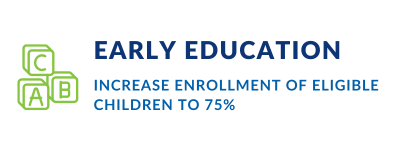
Our current NC Pre-K enrollment rate of 44% is 31% below our 2030 goal of 75%. The charts below show the NC Pre-K enrollment rates for each of our four counties according to the myFutureNC county profiles from 2020, 2022, and 2024 and compare them to our 2030 goal of 75%. Transylvania County has already met, and exceeded, this goal, so the additional 469 enrollments will ideally come from Buncombe, Henderson, and Madison counties. Check out our data dashboard for dozens more charts like these that track our progress toward our educational and workforce attainment goals.
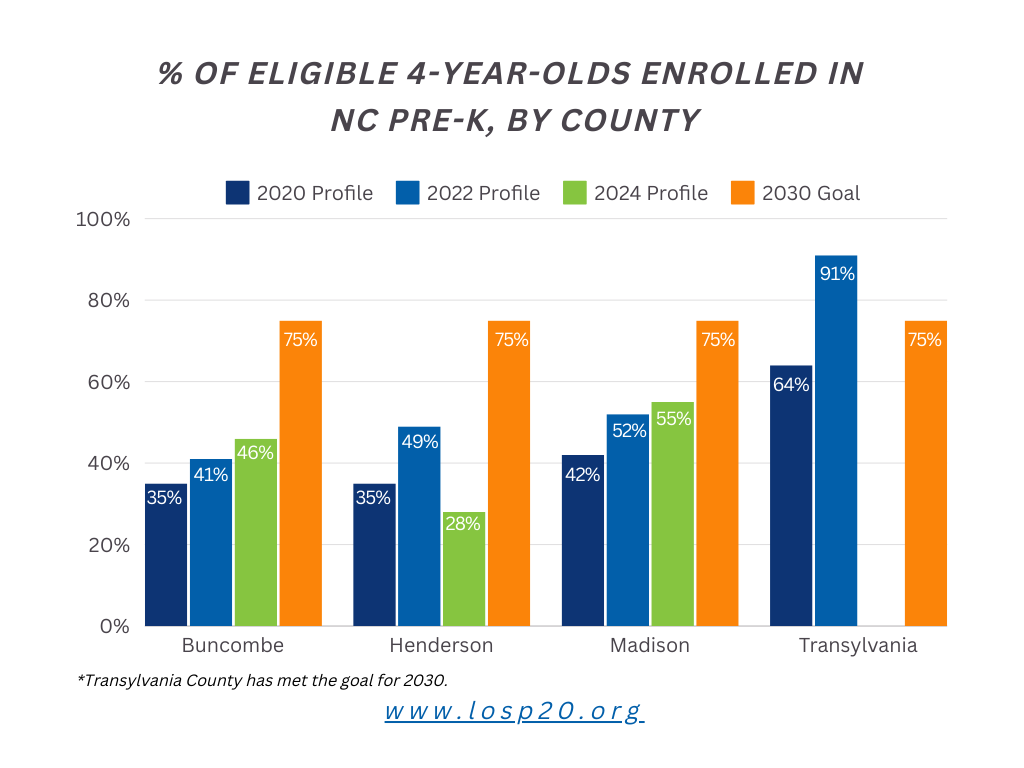
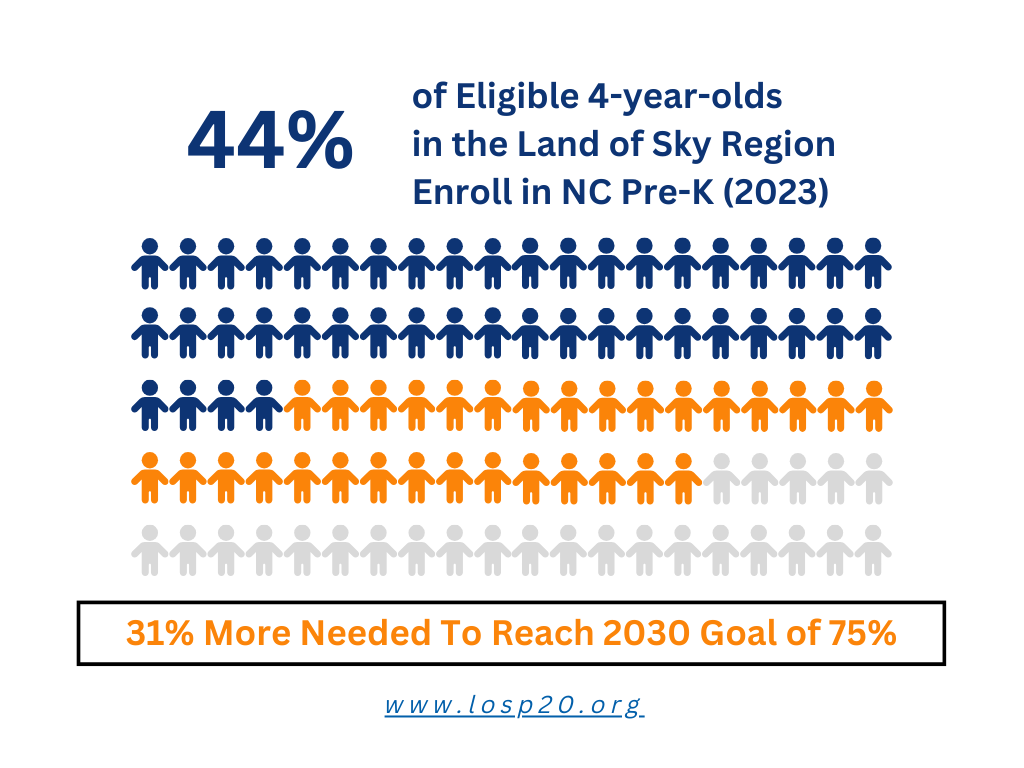
Deep Dive into NC Pre-K Data
Ariel Ford from the Child Development and Early Education Division of the North Carolina Department of Health and Human Services led the deep dive section in this webinar. She began by contrasting the requirements for the NC Pre-K program and child care centers. Next, she explained some of the challenges to expanding NC Pre-K, including the relatively flat funding that the NC General Assembly has chosen to spend on the program in the last two decades.
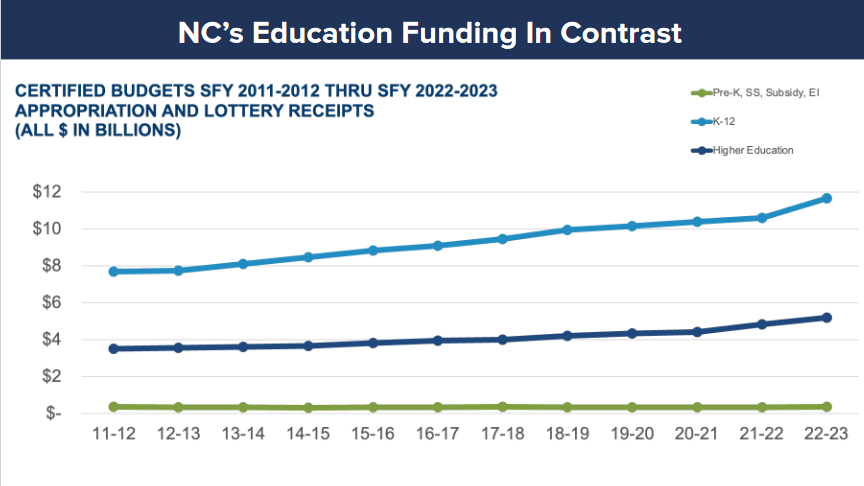
Connections between NC Pre-K Funding and High School Graduation
Unlike the three prior webinars in this series, this one did not include a best practices section. Instead, there was a discussion about how funding and public policy choices affect the state’s progress toward our 2030 goals for NC Pre-K enrollments and how those same funding and public policy choices affect student outcomes later. Dr. Kenneth Dodge, the William McDougall Distinguished Professor of Public Policy Studies at Duke University, presented on his research and evaluation into the long-term effects of the NC Pre-K program on student outcomes. Specifically, his research demonstrated that higher levels of state funding for the NC Pre-K program are associated with increased high school graduation rates. He analyzed data for all children in NC born between 1988 and 2002 (nearly 1 million children) and then followed them throughout their school years until 2021. Dr. Dodge found evidence of a long-term, positive impact of NC Pre-K funding: the on-time high school graduation rate was nearly 75% in counties that received the average level of state funding for NC Pre-K–not the highest level, but the average level–but it was only 68% in counties that received no state dollars for NC Pre-K.
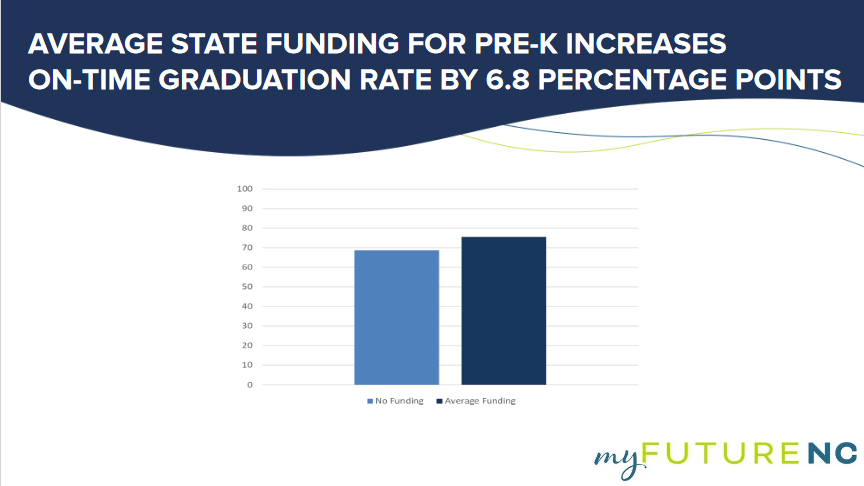
Land of Sky P20 Council's Efforts To Increase NC Pre-K Enrollments
Initiatives
Our most significant initiative at the Land of Sky P20 Council that addressed NC Pre-K and early childhood education was our A3 Education and Workforce Symposium. Speakers at this event who presented on innovative practices regarding early childhood education included Smart Start of Transylvania County, Evolve Early Learning and i.b.mee, Smart Start Partnership for Children, Buncombe Partnership for Children, Verner Center for Early Learning, and BCS Learning Labs. Nearly all of these presenters shared ideas and strategies for growing and supporting the early childhood educator workforce and building capacity to expand NC Pre-K in our region.
Action Teams
Because early childhood education is the foundation and is so important for long-term educational and workforce attainment, all three of our current action teams include a focus on closing gaps in early childhood education, with each action team targeting a different aspect.
Resources
We also provide early childhood education resources for families in our region including Early Childhood Education Contacts for each county and a Pre-K and Early Childhood Education Guide.
Policy Advocacy
Two of the policies in our legislative agenda pertain to early childhood education generally and to NC Pre-K specifically.
- Expand access to NC Pre-K to all four-year-olds through support for families and children.
- Ensure essential infrastructure is in place to accommodate expansion of NC Pre-K to all four-year-olds.
Visit myFutureNC’s NC Pre-K Enrollment indicator page for more information including a definition of NC Pre-K Enrollment, an explanation for why this indicator matters, data on the state’s performance (including long-term trends and data for split out by geography), details on the methodology, and links to other organizations in NC that are working on this topic.
Stay tuned for more in this series. Next up: Top Opportunities for Growth.
